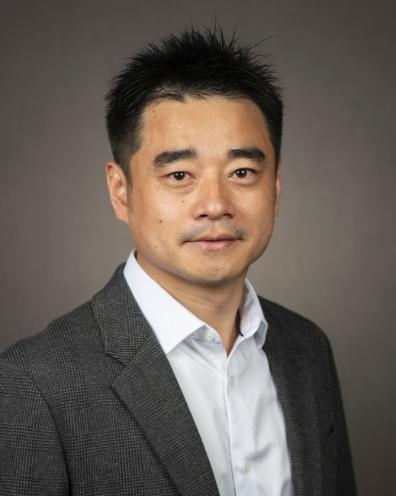Dr. Feng Yue
Assistant Professor — Animal Physiology
Dr. Yue obtained his B.S. in Biological Sciences from Ludong University in China, and his Ph.D. in Marine Biology from University of Chinese Academy of Sciences studying immune cell development. Following his Ph.D. he received his postdoctoral training in the field of skeletal muscle and adipose development at Purdue University and was promoted as Research Associate Scientist upon being awarded a development grant from the Muscular Dystrophy Association. Dr. Yue holds research and teaching appointments in the UF/IFAS Department of Animal Sciences. He specializes in animal physiology with research program to investigate the fundamental mechanisms that control development and growth of skeletal muscle and adipose tissue, particularly focusing on stem cell fate and function and cellular metabolism. His teaching interests include animal growth and development, physiology and stem cell biology.
Academic Positions Since Final Degree:
-
August 2021-present; Assistant Professor, Department of Animal Sciences, University of Florida, Gainesville, FL
-
November 2017 – August 2021; Research Associate Scientist, Department of Animal Sciences, Purdue University, West Lafayette, IN
-
November 2013 – October 2017; Postdoctoral research associate, Department of Animal Sciences, Purdue University, West Lafayette, IN
Programs
-
Research
The research in Dr. Yue’s lab aims to uncover the fundamental mechanisms that control development and growth of skeletal muscle and adipose tissue. In particular, his research programs mainly focus to understand the molecular and cellular mechanisms underlying the fate choice and behavior of muscle stem cell and adipocyte in physiological and disease conditions, including muscular dystrophy, obesity and aging. Utilizing versatile genetic mice and large domestic animals as models, Dr. Yue’s lab brings together cutting-edge single-cell omics, state-of-the-art imaging and stem cell technologies in combining a variety of biochemical and biophysical approaches to address significant and fundamental questions in the field of skeletal muscle biology and adipose metabolism. The goal of his research is to provide knowledge for developing strategies to improve human health and agricultural animal production. The ongoing research projects of Dr. Yue’s lab are outlined into following topics.
- Molecular control of muscle stem cell fate and function
- Nutritional/metabolic regulation of muscle development and growth
- Molecular and cellular mechanisms underlying intramuscular adipogenesis
- Pathogenesis and therapy of neuromuscular diseases
-
Teaching

Contact
Bldg 459, Shealy Drive
PO Box 110910
Gainesville, FL 32611
Phone: (352) 392-2993
Fax: (352) 392-5595
fengyue@ufl.edu
Yue Laboratory: Stem Cell - Metabolism - Health & Disease
-
Education
Education:
- July 2013; Ph.D. Field: Developmental Immunology, University of Chinese Academy of Sciences, Beijing, China
- June 2010; M.S. Field: Animal Physiology, Ocean University of China, Qingdao, China
- June 2007; B.S. Biological Sciences, Ludong University, Yantai, China
- Publications
-
Professional Service and Awards
Professional Memberships
Honors and Recognition
- 2017; Seeds for Success Award, Purdue University, USA
- 2017; Postdoc Travel Award, Purdue University, USA
- 2016; Postdoc Travel Award, Purdue University, USA
- 2015; Postdoc Challenge Award, Purdue University, USA
- 2015; Poster Award in Diabetes and Metabolic Diseases 1th Annual Symposium, Indiana University School of Medicine, USA (Top1)
- 2014; Excellent Scholarships of Chinese Academy of Sciences, China
Scientific Services
- 2020 to present; Research Reviewer for Frontiers in Cell and Developmental Biology
- 2020 to present; Research Reviewer for Frontiers in Genetics
- 2017 to present; Invited Reviewer for The FASEB Journal
- 2017 to present; Invited Reviewer for Molecular and Cellular Biochemistry
